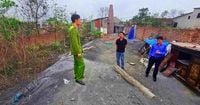Authorities in Bac Ninh, Vietnam, have launched an investigation into an illegal waste dumping incident involving nearly 123 tons of aluminum dross. The incident was uncovered on March 31, 2025, when police caught a worker in the act of disposing of hazardous waste from an aluminum smelting operation owned by Nguyen Thi Thinh, a resident of Dai Bai commune in Gia Binh district.
According to the Bac Ninh police, the aluminum casting furnace was actively operating with three workers present at the time of the inspection. The waste, which consisted of aluminum dross—a byproduct generated during the aluminum smelting process—was found dumped on agricultural land behind the furnace.
The investigation revealed that Nguyen Thi Thinh's property is classified as agricultural land intended for aquaculture. This land is not permitted for residential use or industrial production, nor is it authorized for the disposal of waste materials. This lack of proper licensing raises serious environmental and legal concerns.
This incident highlights ongoing issues related to illegal waste disposal practices in Vietnam, where improper handling of industrial byproducts poses risks to both public health and the environment. Local authorities have been stepping up efforts to monitor and regulate such activities to prevent further violations.
As the investigation continues, the Bac Ninh police are collaborating with relevant agencies to gather more evidence and determine the full extent of the violations. The case serves as a reminder of the importance of adhering to environmental regulations and the need for proper waste management practices.
Nguyen Thi Thinh, born in 1969, is now facing potential legal repercussions for her role in this incident. Authorities are expected to take stringent actions against those involved in the illegal dumping to deter similar offenses in the future.
The situation has sparked discussions among environmentalists and community members about the need for stricter enforcement of environmental laws in Vietnam. Many are calling for increased awareness and education on waste management, especially in rural areas where regulations may not be as strictly enforced.
Residents of Dai Bai commune have expressed their concerns about the potential health risks associated with such illegal dumping activities. Many are worried that the contamination of agricultural land could affect local water sources and food safety.
In response to the incident, local government officials have pledged to enhance monitoring efforts and conduct regular inspections of industrial operations to ensure compliance with environmental standards. The local community is hopeful that these measures will lead to a safer and cleaner environment.
As the investigation unfolds, it remains crucial for the authorities to address not only the immediate violations but also the broader systemic issues that allow such practices to occur. The case of Nguyen Thi Thinh's aluminum smelting operation serves as a significant example of the challenges facing Vietnam in balancing industrial growth with environmental protection.
With the increasing demand for aluminum and other metals, ensuring responsible production and waste management practices is more important than ever. The incident in Bac Ninh could serve as a catalyst for broader reforms in how industrial waste is managed across the country.
As the public awaits further developments in this case, it is clear that illegal dumping cannot be tolerated, and all stakeholders must work together to uphold environmental standards. The health of the community and the integrity of the environment depend on it.





